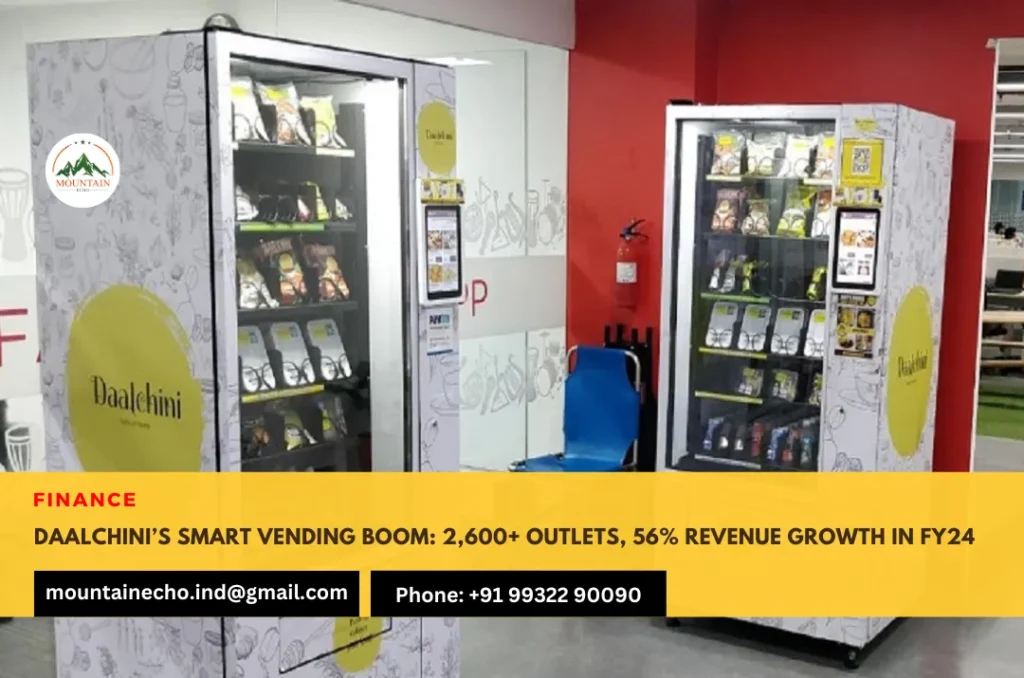Daalchini’s Smart Vending Boom: 2,600+ Outlets, 56% Revenue Growth in FY24
WhatsApp Channel
Join Now
Daalchini Technologies was founded in 2017 by ex-Paytm executives Prerna Kalra and Vidya Bhushan. The company provides IoT-based smart vending machines for on-the-go consumption. Its supply chain is designed to serve customers six meals a day.
The number of retail outlets has grown more than tenfold since the COVID pandemic. Pre-COVID-19, it had less than 200 outlets. Now, it operates over 2,600 outlets across more than 80 cities.
Daalchini claims to be India’s first vending machine provider. It competes with players like Wendor, NutriTap Technologies, and Vendekin Technologies.
The Indian vending machine market is experiencing significant growth, with a projected CAGR of 14.9% during 2020-2026, driven by rapid urbanization, digitization, and higher retail investment. The potential market is estimated at 6 million vending locations.
Daalchini has shown strong growth in the previous eight quarters. Its CAGR growth rate during this period is 123%. It improved its financials in FY24 as well. Net loss reduced by 32% to INR 9 Cr in FY24 from INR 13.3 Cr in FY23.
This was due to a sharp rise in operating revenue. Operating revenue increased by 56% to INR 18.3 Cr in FY24 from INR 11.7 Cr in FY23. Total revenue, including other income, reached INR 18.5 Cr in FY24.
Daalchini earns revenue through multiple streams. Sales of vending machines generated INR 7.27 Cr in FY24, up from INR 6.41 Cr in FY23. Services, mainly machine rentals, earned INR 11.05 Cr in FY24, a jump from INR 5.28 Cr in FY23.
Product sales through vending machines contribute 40% to revenue. Margins range between 12% and 45%. Monthly rental fees from machines contribute another 40%. Advertising revenue from brands makes up the remaining 20%. This includes 5% from listing fees and 15% from other advertising.
Expenses rose despite reduced losses. Total expenses grew by 36% to INR 26.97 Cr in FY24 from INR 19.83 Cr in FY23. This increase was driven by a 56% rise in other expenses and a 10% rise in procurement costs. However, employee benefit expenses were cut by 12%.
Product and Service Offerings
Daalchini’s smart vending machines offer more than just snacks and beverages. They provide fresh meals catering to six meal times a day. Products include beverages, beauty items, essentials, wellness products, stationery, books, OTT products, and industrial goods.
The machines are placed at retail stores, offices, schools, hospitals, metro stations, IT parks, malls, and residential communities. The vending machines are cashless, app-based, and contactless. They support payments through UPI, mobile wallets, and cards.
Daalchini partners with over 190 D2C brands and cloud kitchens. Major players include Nestle, Parle, Mother Dairy, Haldirams, and Bikanerwala.Its client list features big names like Fortis, Apollo, AIIMS, Amazon, EY, Accenture, Tata, Reliance, Adani, The Times of India, Paytm, and NITI Aayog.
Daalchini focuses on the Indian market’s unique needs. Around 80% of their machines offer six meal varieties. It offers highly customised product assortments tailored to each location’s demographics and preferences.
Technology and Innovation
Daalchini uses AI to optimise its operations. It collects data on customer preferences, purchase patterns, and peak buying times. This data helps in deciding product assortment, pricing, and restocking.
AI helps Daalchini track demand shifts and adapt to seasonal trends. It ensures vending points meet hyperlocal needs efficiently. The goal is to increase product sales within a small area. Its consumer app uses AI to analyze customer behavior and recommend personalised products.
Daalchini also uses IoT for remote monitoring and real-time restocking updates. Its proprietary OFT (Order for Tomorrow) engine predicts the right quantity of fresh meals to restock daily. This reduces food wastage. The engine is trained on historical sales data and customer consumption patterns.
Products nearing expiration are automatically deactivated by the system. Vending machines are equipped with CCTV surveillance for security.
Business Model and Expansion Strategy
Daalchini follows two business models.
In the Rental Model, it rents machines to clients and manages all operations.
In the Franchise Model, partners buy the machines and handle operations. Daalchini provides technology and supply chain support. Over 95% of its machines are partner-owned.
Daalchini plans to expand aggressively. The company is focusing on Tier II and III cities with large working populations. It aims to grow its network of smart retail outlets from 1,600 to over 5,000 within the next 12-18 months.
They envision having their “autonomous smart stores and vending machines in every 500 meters of livable space in India” and aim to reach smaller towns and isolated places. Beyond vending machines, Daalchini is also looking at micro-market setups and fully automated kiosks to expand its retail presence.
Funding and Competition
Daalchini has raised a total funding of more than $5.17 Mn to date.
Their last funding round was a $4 million Series A in 2022, led by Unicorn India Ventures with participation from existing investors like Artha Venture Fund and others.
While there are no immediate funding plans mentioned, their competitor Wendor recently announced raising INR 21 Cr.
Daalchini differentiates itself from competitors by its focus on hyper-localisation and customisable product assortments tailored to specific Indian market needs.
Telegram Channel
Join Now



